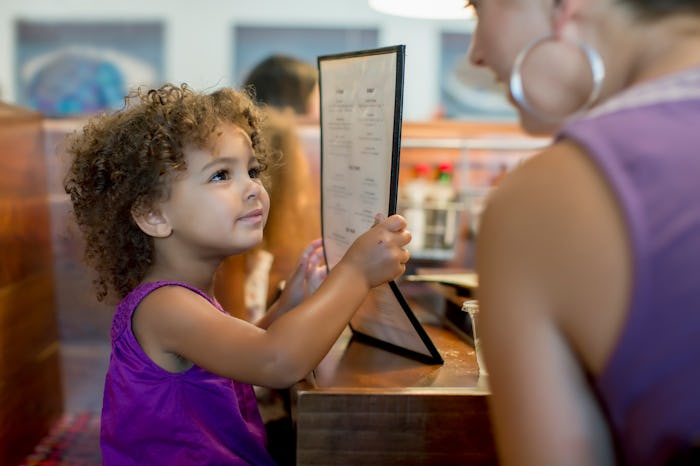Life

Is It Safe To Take Your Kids To A Restaurant? Experts Explain
After months of serving three meals and countless snacks daily to your ever-present family, you’re probably ready to put Mom’s Diner on permanent hiatus. So if your state is now allowing indoor dining or outdoor dining, you might be tempted to make a reservation. But should you bring your kids to a restaurant? Sure, it would be great to have someone serve you dinner for a change, but it's not worth your family's health.
“You need to really think if the benefits outweigh the risks," pediatrician Dr. Alison Mitzner M.D. tells Romper in an email.
The risks are well-documented, and show no signs of going away. "Public-health experts and government officials say they are worried bars and restaurants are playing a significant role in increasing Covid-19 case counts across parts of the U.S.," reported The Wall Street Journal on July 3. Restaurants pose "particular challenges" for transmission control, the WSJ continued: The easiest way for the coronavirus to spread is "indoors through close, prolonged contact without protection;" "loud talking, not wearing masks and drinking alcohol" are among the riskiest behaviors.
“If you decide to eat outside the home, the lowest risk would be take-out or delivery options,” says Dr. Mitzner. “If you prefer on-site dining out, I would use caution. Stick to outdoor dining rather than indoor.” Dr. Mitzner also recommends checking out your city’s data on the current number of COVID-19 cases before making any plans to dine out. “If the cases are growing each day, use caution and consider holding off,” she says.
Mitzner's recommendations are in line with those of the Centers for Disease Control and Prevention (CDC), which state that delivery, takeout, drive-through and curbside pickup are the safest options because they involve fewer transactions between people. Still, if you decide to try outdoor or indoor dining, there are some steps you can take to make the experience as safe as possible.
“Research the restaurant before you go and see what safety precautions they have set up for their restaurant for keeping you safe, such as social distancing, masks, and sanitizing,” says Dr. Mitzner. And if the restaurant looks exactly as it did pre-pandemic when you walk in, walk right back out. “Tables need to be widely spaced apart,” licensed physician Leann Poston M.D., M.B.A., M.Ed., tells Romper. “And all workers should be wearing a mask.”
The same goes for you and your family. “Ideally, everyone would wear a mask at all times, except for eating,” says Dr. Poston. And if you thought you were going to have a leisurely lunch with apps, entrees, and dessert, think again. “Keep the meal quick,” says Dr. Mitzner.
If your kid is the type to touch the table, the chairs — even the gross gooey stuff under the tabletop — you'll definitely want to pack a preparedness bag. “Be sure to have alcohol wipes and/or hand sanitizer with you to clean your hands prior to eating in case the restaurant doesn’t have or runs out,” says Dr. Mitzner. “Be careful with items and objects others would have touched such as table counters, and if you or your kids do touch, be sure not to touch your mouths or faces.”
Timing is also an important factor. “Choose a time period that is not crowded over one that is,” says Dr. Poston. “You want to minimize the time you are spending inside.”
And while you'll of course make sure that everyone uses the bathroom before leaving the house, there’s bound to be a kid who has to go when you're on the go. If that’s the case, tread cautiously. “As for bathrooms, there is still the question about whether viral particles, that are aerosolized when the toilet flushes, are infectious,” says Dr. Poston. Make sure that your child doesn’t remove their mask while in the loo, and try to move things along as quickly as possible.
Ultimately, you'll have to use your best judgment to decide if eating out at a restaurant right now is worth the potential risk, hassle, and stress. If you want to support your local restaurants, you can always opt for takeout or delivery, and eat safely inside your home or picnic in your backyard — no social distancing or masks required.
If you think you’re showing symptoms of coronavirus, which include fever, shortness of breath, and cough, call your doctor before going to get tested. If you’re anxious about the virus’s spread in your community, visit the CDC for up-to-date information and resources, or seek out mental health support. You can find all of Romper’s parents + coronavirus coverage here.
Experts:
Dr. Alison Mitzner, M.D., pediatrician
Dr. Leann Poston, MD, M.B.A., M.Ed., licensed physician